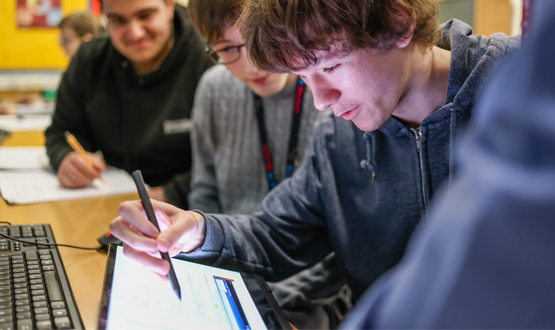Course Information
Title: Computer Science
Type: A Level
Entry Requirements: Standard entry requirements including a minimum of a 6 in mathematics or 5 in computing. Previous study of ICT is not required.
Course Length: 2 Years
About
Computer Science at A Level is a subject which helps students understand the core academic principles of computer science. It requires a systematic and logical approach to problem-solving. The ability to reason logically and to be able to see rules and patterns and how they fit together is a very important attribute for the subject.
What will I study
There are three units to the course:
COMP 1 covers computational theory whereas COMP 2 is more focused on algorithms and the practicalities of coding. There is a good amount of crossover,
so you will often be covering topics from COMP1 with the practical application of the theory in COMP2
COMP3 (Year 13) is a practical programming project worth 20% of your final A Level and will occupy much of your Y13 time. This is a substantial piece
of coursework which will be started at the end of Y12 and be submitted at Easter in Y13.

How will I be assessed?
This subject is assessed by two examinations at the end of your course and by the submission of your coursework
Assessment Overview
2 hour 30 minutes written paper
40% of total mark
2 hour 30 minutes written paper
40% of total mark
Coursework - Programming Project
20% of total mark
Interim Assessments
You will also sit a number of end of unit assessments to measure your progress throughout the course. These will consist of past A Level questions
based on the topic or topics you have covered in that half term.
In addition, there are a number of practical tasks which you will be set that are intended to get you into the way of working which is required for
the COMP 3 project. You will need to complete a project write-up for each of these tasks, as well as write a functional program to solve a given problem.
Finally, you will have some extended investigation tasks which you will need to complete independently, in line with the way universities work.
Where can Computer Science lead?
Careers in computing include: Artificial intelligence specialist, Bioinformatics software engineer, Cisco certified internetwork expert, clinical informatics director, computer forensics investigator, computer hardware engineer, computer science professor and computer support specialist.
What Students Say:
"I really enjoyed studying computer science, the course was challenging and interesting, it allowed me to go in depth into areas I wanted and helped me develop my problem solving and research skills in developing my own software. The staff were always ready to help me inside and outside of lessons too – I would recommend it to anyone!"
